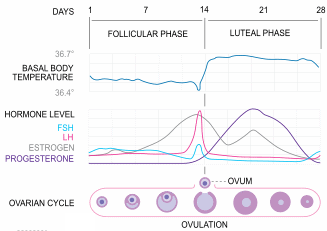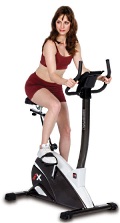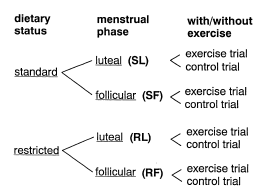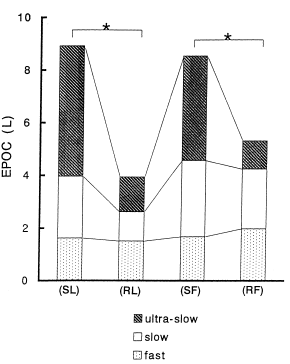|
Definition: "An ergogenic aid is any substance or phenomenon that enhances performance "
|
|
||||||||
28.12.2009 |
|
|
Strict diet reduces post-exercise energy burning
A slimming diet with reduced energy intake not only reduces your muscle mass but also works a little less well with athletes than you'd expect. A strict diet reduces the amount of energy you burn after training, according to an older Japanese study.
In 2000 sports scientists at Hiroshima Women's University published an article in Clinical Physiology, describing an experiment they did with 5 non-active female students aged 21-22 years. The students had to cycle for an hour at 70 percent of their VO2max. That's an intensity at which it's no longer possible to carry on a conversation. The researchers then measured the test subjects’ EPOC during the seven hours after the exercise session.
What's interesting about the study is that the researchers measured the students' EPOC under four different sets of conditions. To start with the researchers looked at the students during the first and second half of the their menstrual cycles. During the first half, the follicular phase, women have more estradiol in their bodies, they produce more LH and FSH and their body temperature is lower. During the second half, the luteal phase, after ovulation, women have raised progesterone levels in their body and their body temperature is somewhat higher.

The researchers also looked at the students' energy intake. On one occasion they got the students to eat half the normal amount on the day before and on the day the measurements were taken. On the other occasion the students ate normally.
So there was a total of 4 different conditions under which measurements were made.
The figure below shows how much extra energy the students burned after their training under the four different sets of conditions. The stage at which they were in their menstrual cycle had no effect, but their energy intake did make a difference.
The EPOC during the first 15 minutes after the training the Japanese refer to as 'fast'. The next period, up to two and a half hours after the training, is referred to as 'slow'. The period after that, up to the end of the measuring period, is referred to as 'ultra-slow'. A low-calorie diet reduces the EPOC especially in the later phases.
"The reduction of EPOC induced by the acute dietary-restricted status may have an important implication for individuals using exercise as a means of body weight loss", the Japanese conclude. They mean that a too strict diet will reduce the amount of energy your body continues to expend after exercise.
Another argument against crash diets: Canadian researchers published a study last year in which women on a diet who did fitness training did not get any fitter. [Menopause. 2009 Jan-Feb;16(1):66-72.] The diet stopped their body from adjusting to the training.
Source:
More:
|
|



